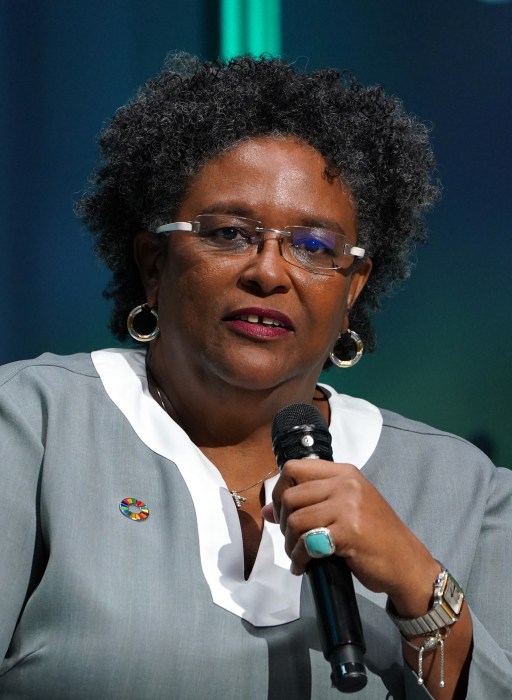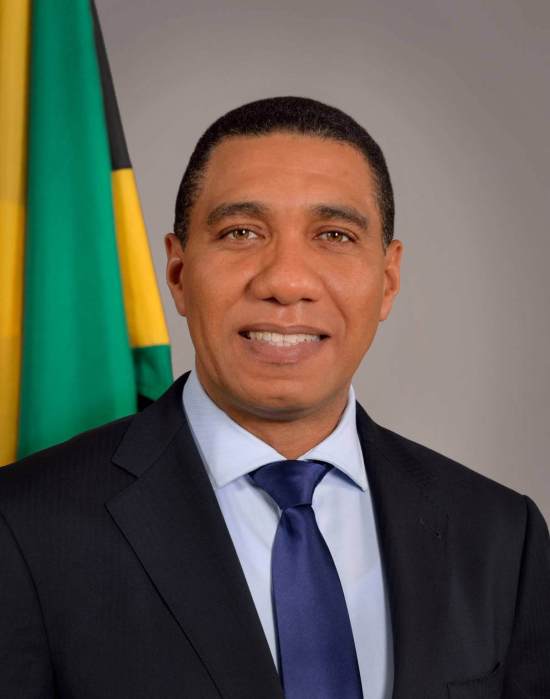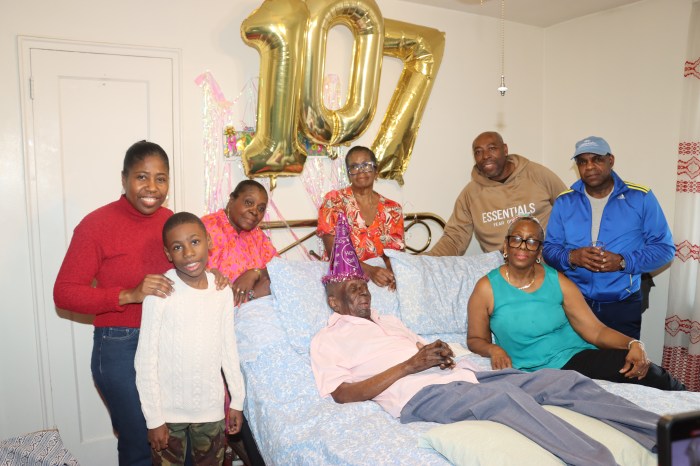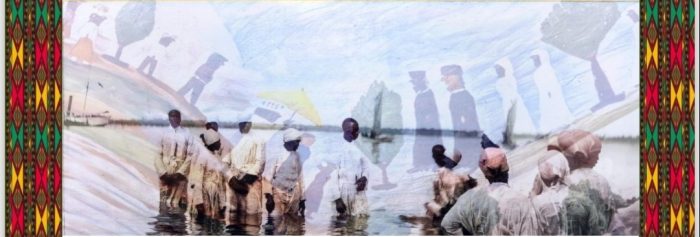Stating that reparatory justice is an intergenerational struggle for Caribbean countries, Chairman of the CARICOM (Caribbean Community) Reparations Commission (CRC) Prof. Sir Hilary Beckles has called for the continued fight for reparatory justice from European colonial powers.
“So, yes, you have to keep the movement going,” said Prof. Sir Hilary, who is also vice-chancellor and chairman of the Board of Trustees the University of the West Indies (UWI), in responding to a Caribbean Life question, on reparatory justice for Caribbean countries, Friday evening during the Brooklyn Caribbean Literature Festival’s (BCLF) “Faces of the Caribbean” at the historic Weeksville Center on Buffalo Avenue in Brooklyn.
“Now, it’s happening,” added Sir Hilary, hoping that the new Labor government in the British Parliament will soon take up the issue. “Now, it’s how to do this. How do you compensate for a crime? You’re talking about 40 million people. How do you begin to contemplate? So, we have to find a strategy.
“There’s no carpet in the world too big,” continued Sir Hilary, who is also vice president of the International Task Force for the UNESCO (United Nations Educational Scientific and Cultural Organization) Slave Route Project, a consultant for the UNESCO Cities for Peace Global Program and an advisor to the UN World Culture Report. “So, we’re already seeing it.”
He said the CRC has adopted a three-part strategy in its pursuit for reparatory justice: “Apologize – admit that you did it; strategize to repair the harm caused; and never do it again.”
“I don’t think the third phase is simple,” said Sir Hilary at Friday night’s session that was moderated by Dr. Richard Georges, the British Virgin Islands’ inaugural poet laureate and president of the H. Lavity Stoutt Community College in Tortola. “We’re seeing reparations’ phase I and II, and we’re getting there.”
The CRC is a regional body created to establish “the moral, ethical and legal case for the payment of reparations by the governments of all the former colonial powers and the relevant institutions of those countries to the nations and people of the Caribbean Community for the “Crimes against Humanity of Native Genocide, the Trans-Atlantic Slave Trade and a racialized system of chattel Slavery.”
The CRC said discussions on the issue of Reparations for Native Genocide and Slavery were initiated at the 34th Regular Meeting of the Conference of Heads of Government of CARICOM in July 2013 in Trinidad and Tobago following a proposal from the Prime Minister of St. Vincent and the Grenadines, Dr. Ralph E. Gonsalves, to engage the United Kingdom and other former colonial European nations on the matter.
The CRC said the proposal of Prime Minister Gonsalves was made against the backdrop of a book written by Sir Beckles, entitled “Britain’s Black Debt: Reparations for Caribbean Slavery and Native Genocide.”
At the inaugural discussions, the CRC said Heads of Government expressed unanimous support for the initiative and defined a governance arrangement for its implementation.
A Prime Ministerial Sub-Committee (PMSC) on Reparations was established under the chairmanship of the prime minister of Barbados and comprising the chair of conference and the Heads of Government of Guyana, Haiti, St. Vincent and the Grenadines, and Suriname to oversee the work of the Reparations Commission.
The CRC said the conference also agreed on the establishment of national reparations committees and a regional CARICOM Reparations Commission, constituted by chairpersons of the national committees.
The CRC said it first met in September 2013 in St. Vincent and the Grenadines, and that National Committees on Reparations have been established in 12 member-states to date.
As at February 2016, National Reparations Committees have been established in the following member states: Antigua and Barbuda, The Bahamas, Barbados, Belize, Dominica, Guyana, Jamaica, St. Kitts and Nevis, St. Lucia, St. Vincent and Grenadines, Suriname, and Trinidad and Tobago.
The CRC asserted that victims and descendants of Crimes against Humanity have “a legal right to reparatory justice, and that those who committed these crimes, and who have been enriched by the proceeds of these crimes, have a reparatory case to answer.”
The CARICOM Reparations Justice Program (CRJP) recognized “the special role and status of European governments in this regard, being the legal bodies that instituted the framework for developing and sustaining these crimes,” the CRC said.
“These governments, furthermore, served as the primary agencies through which slave-based enrichment took place, and as national custodians of criminally accumulated wealth,” it said.
The CRC said that European governments: “Were owners and traders of enslaved Africans instructed genocidal actions upon indigenous communities; created the legal, financial and fiscal policies necessary for the enslavement of Africans; defined and enforced African enslavement and native genocide as in their ‘national interests’; refused compensation to the enslaved with the ending of their enslavement; compensated slave owners at emancipation for the loss of legal property rights in enslaved Africans; imposed a further 100 years of racial apartheid upon the emancipated; imposed for another 100 years policies designed to perpetuate suffering upon the emancipated and survivors of genocide; and have refused to acknowledge such crimes or to compensate victims and their descendants.”
The CRC said it is “committed to the process of national international reconciliation.
“Victims and their descendants have a duty to call for reparatory justice,” it said. “Their call for justice is the basis of the closure they seek to the terrible tragedies that engulfed humanity during modernity.”
The CRC said it comes into being some two generations after the national independence process, and finds European colonial rule as “a persistent part of Caribbean life.”
“The CRC operates within the context of persistent objection from European governments to its mandate,” it said. “The CRC, nonetheless, is optimistic that the CRJP will gain acceptance as a necessary path to progress.
“The CRC sees the persistent racial victimization of the descendants of slavery and genocide as the root cause of their suffering today,” it added. “The CRC recognizes that the persistent harm and suffering experienced today by these victims as the primary cause of development failure in the Caribbean.”
The CRC called on European governments to participate in the CRJP with a view to prepare these victims and sufferers for full admission with dignity into the citizenry of the global community.
Dr. Verene Shepherd, social historian and director of the Centre for Reparation Research at UWI in Mona, Kingston, Jamaica, said, “the human suffering of the Africans who were captured, trafficked across the sea and enslaved in the Americas, as well as the indigenous peoples who also suffered under the barbaric colonial system, are well known.
“What may be less known are the enduring financial implications, for the enslaving societies as well as for the slaves and their descendants,” she said, writing in UNESCO Courier in July.
“More and more frequently, governments and institutions that benefited from the conquest, chattel enslavement and colonialism are being demanded to acknowledge the role they played in these systems, and to make adequate restitution,” Dr. Shepherd added. “This is increasingly so in the Global South, which is broadly comprised of Africa, Latin America and the Caribbean, and parts of Asia and Oceania.
“The key demand is for these entities to recognize that their wealth was created from the destruction of countless racial and ethnic communities, cultures and societies, which continue to have far-reaching implications on their ability to thrive,” she continued.
Dr. Shepherd noted that this has already been demonstrated by the late St. Lucian economist and Nobel laureate Sir Arthur Lewis, author of Labor in the West Indies in 1939; the late historian and first Prime Minister of Trinidad and Tobago Dr. Eric Williams, who wrote Capitalism and Slavery in 1944; and Dr. Beckles.
The CRC said its progress over the last decade includes the implementation of a “robust reparatory justice advocacy and public education campaign.”
It also said the CARICOM 10-Point Plan for Reparatory Justice, developed by the CRC in 2014, has also received significant support from CRC stakeholders.
The CRC said the UN Permanent Forum of People of African Descent, at its inaugural meeting in Geneva in December 2022, expressed support for the CARICOM 10-Point Plan and called for its adoption globally.
The NAARC, established in April 2015 in New York, has articulated a 10-Point Action Plan based on the CARICOM model.
The CRC said Reparations Commissions or advocacy groups have been established or are in development in Brazil, Colombia, Canada, the United Kingdom and the Netherlands, inspired by CARICOM’s lead.
The CRC said its “commitment and determination remain firm in the vision of a path to reconciliation, truth, and justice for the victims of slavery and their descendants.”
The elements of the plan include: A Full and Formal Apology; Indigenous Peoples Development Programs; Funding for Repatriation to Africa; The Establishment of Cultural Institutions and the Return of Cultural Heritage; Assistance in Remedying the Public Health Crisis; Education Programs; The Enhancement of Historical and Culture Knowledge Exchanges; Psychological Rehabilitation as a result of the Transmission of Trauma; The Right to Development Through the Use of Technology; and Debt Cancellation and Monetary Compensation.
“The reparations movement is a call for partnership,” Sir Hilary said. “It’s a call for diminishing the debt owed to the people of this region. And it’s a call to have a shared vision for the future.
“We’re not calling for racial strife,” he added. “We’re not calling for international conflict. We believe reparations is the key for a win-win strategy for both sides of this conversation.”
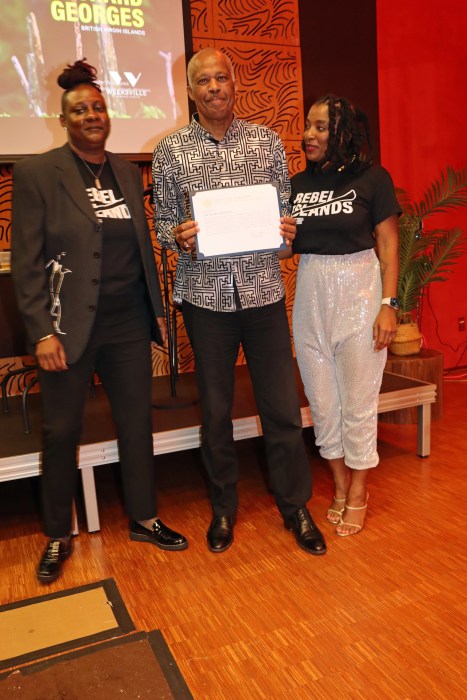
Marsha Massiah, the Trinidadian-born founder and executive director of the BCLF, said that this year’s festival, themed “Faces of the Caribbean,” was a “vibrant celebration of Caribbean culture and literature,”featuring a remarkable lineup of authors, scholars and cultural figures.
Massiah told Caribbean Life that BCLF was set to “illuminate Brooklyn” with its sixth edition, scheduled for Sept. 5-8, 2024.
“Faces of the Caribbean is a true testament to my team’s aggregate effort of the last six years to build a sustainable and robust platform for Caribbean writers in the Diaspora,” she said. “BCLF is a conduit for channeling Caribbean culture and its very rich literary heritage through storytelling.”
Massiah said BCLF’s goal is “to reveal the less commonly acknowledged nature of Caribbean excellence, which is the wealth of our intellectualism, fiction and indigenous stories.
“We are well-known for music and food, but our literature doesn’t seem to enjoy the same prominence in the popular imagination,” she said. “The Caribbean story, being universal in scope, is the great equalizer for the human experience. The Caribbean story has the power to unite and settle the great debate questions of difference. The Caribbean story absorbs the highs and lows of the human experience and refracts its light back onto the hearts of its reader.”
This year, Massiah said BCLF “assembled some of the brightest and best minds in global academic thought, music, poetry and journalism to celebrate with us and cement the rightful place of the Caribbean writer in the global literary canon.”
Besides Sir Hilary, she said the festival highlighted an illustrious roster of literary talent.
Massiah said the event welcomed Haitian-American luminaries Edwidge Danticat and Roxane Gay, who launched Danticat’s highly anticipated collection of essays, “We’re Alone” (Graywolf Press, 2024).
Trinidadian journalist and author Dr. Dominic Kalipersad shared the stage with Dr. Kevin Browne, while P. Djèlí Clark, a recipient of the Locus Award, made a celebrated return, Massiah said.
She said US Virgin Islands-born Tiphanie Yanique joined the festival for the first time, and Dr. Georges conducted a poetry workshop.
Other notable authors included: Angie Cruz, Kellie Magnus, Jasmine Sealy, Alscess Brown, Heather Archibald, Christina Cooke, Lisa Allen-Agostini, Jive Poetic, Rico Frederick, Michael Cooper, Mervyn Taylor, Yesha Townsend, Yesenia Montilla, Lauren Alleyne, Mercy Tullis Bukhari, Derron Sandy, Roberto Carlos Garcia, Cleyvis Natera, Merle Collins, Bill Howell, Roland Watson-Grant, Christina Olivares, Deborah C. Mortimer, Janet Morrison, Esmeralda Santiago, Lorna Goodison, Barbara Jenkins and Anesia Alfred.
“The contest, now among the most prestigious for Caribbean writers, celebrates the voices that contribute to the rich tapestry of Caribbean literature,” Massiah said. “The theme ‘Faces of the Caribbean’ highlights the diverse identities, traditions and experiences that define Caribbean culture.”
She said the festival was supported by a range of sponsors, including The Hawthornden Foundation, Center for Fiction, NYU, Ten to One Rum, The Security Zone (Trinidad & Tobago), and Akashic Books.
Massiah said Trinidad and Tobago-based Patrick Rasoanaivo & Chasing the Caribbean conceptualized the festival’s branding and graphic image.



